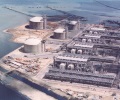

Singapore LNG Corp is making enquiries about buying LNG cargoes from the spot market, a rare move for the operator of the city-state’s liquefied natural gas (LNG) terminal, industry sources said.
The enquiries come on the back of surging prices globally of power generation fuels such as LNG and coal, amid power shortages from China and India to Europe.
SLNG contributes to Singapore’s energy security and its terminal supplies up to 30% of the city state’s natural gas demand for power generation, its website says.
SLNG is looking for LNG in the spot market privately, four sources said on Wednesday, with one of them adding that it is seeking up to two cargoes for delivery into Singapore in November.
The company is exploring options to increase inventory of LNG at its terminal given tight global LNG supply, a SLNG spokesperson told Reuters in an e-mailed statement.
“The information will help us plan our operations better,” the spokesperson said, declining to provide further details.
Singapore’s Energy Market Authority (EMA) did not immediately reply to a Reuters request for comment.
It is unusual for Singapore to seek spot LNG cargoes as the country is typically adequately supplied with LNG through long-term deals and gas imports from Indonesia via a pipeline. One of the sources said the request from SLNG came after Singapore’s electricity prices jumped.
Singapore’s monthly base load electricity futures have surged by more than double since the start of the month while the quarterly base load electricity energy futures are trading at their highest since the contract was launched in 2015.
About 95% of Singapore’s electricity is generated from imported natural gas with the country’s long term gas and LNG cargoes linked to oil prices.
Spot LNG prices in Asia LNG-AS surged to record highs last week while Brent crude oil futures spiked to multi-year highs this week. Singapore is the Asian trading hub for LNG and aims to capitalise on an expected rise LNG demand in the region.
There are currently four companies that have licenses to import LNG into the city state under long-term contracts of one year or more, which allows them to sell LNG in Singapore.
Spot LNG may be imported for local use by Singapore gas users either in the form of LNG or regasified LNG, though the allowed annual quantity is capped at 10% of total contracted gas volume under long-term gas sales agreements for both LNG and piped gas, according to SLNG’s website.
Singapore’s long-term piped gas contracts with Indonesia start expiring from 2023, when the country has plans to import more LNG from the global market.
Source: Reuters (Reporting by Jessica Jaganathan and Roslan Khasawneh; Editing by Raju Gopalakrishnan)